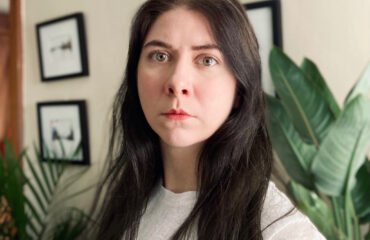POST-IMPAIRMENT SYNDROME by Victoria C. Flanagan

25% of people with cerebral palsy who are able to walk as children
will lose the ability as they get older.
The steakhouse waiter sharpens his knives in light:
times like these, there’s no such thing as a whetstone, only
this knowledge: one’s required. Blades catch
on the refracted traffic signal, this roundtable flurry:
the place is full of men again, exhibit in the window
like I remember: wrinkled shirt and a too-big face
on the watch still running on a battery—you could tell,
too, if you look at the way the secondhand jolts: 1, 1, 1, 1.
My father taught me
that a watch is only as good as its movement—automatic glide
promising there are objects that will outlast you,
but not this. Not his cheap timepiece. Not this threat of boys
from the Capitol building across the street.
I walk by most days as if on a wire: down Johnson, up Hamilton,
twice around the square.
Technically, my time has been paid for
by four countries, three members of the EU, two municipalities, and men in suits
like those: which is to say, I, too, went to grad school
with lips like mine. And I count my steps
because I am walking the length of the Appalachian Trail
before I can’t. I have not bought a watch that will calculate distance—
the reasons are obvious to you by now. And, once, I tried to fall
for the VP of a Virginia bank because he wore a Hamilton to our first date
and ordered zero drinks and I watched, dutifully, the slur
of his secondhand, the kind of slip that is so quiet, it must be time passing
and nothing more. When we were trapped in his house in a snowstorm
he told me he hired sex workers and left room for my confession, too:
my brain cannot control my muscles and my body will ripen to arthritis
by the time I’m thirty. Across town, a doctor
knows I may be losing my ability to walk. One in four: 1. 1. 1. 1. Every body
has an economy. The VP sits up and says You mean the girl I’m trying to fuck
is disabled? And the table of men in the window, years later, cock
their heads and laugh. My reflection lingers
as I pass, the stutter of my gait a pause just long enough to notice
a sheetpan of Anjou pears in the window, waiting faithfully
for Sunday brunch: they are fresh-picked and perfect, they are sugaring
toward pulp.


